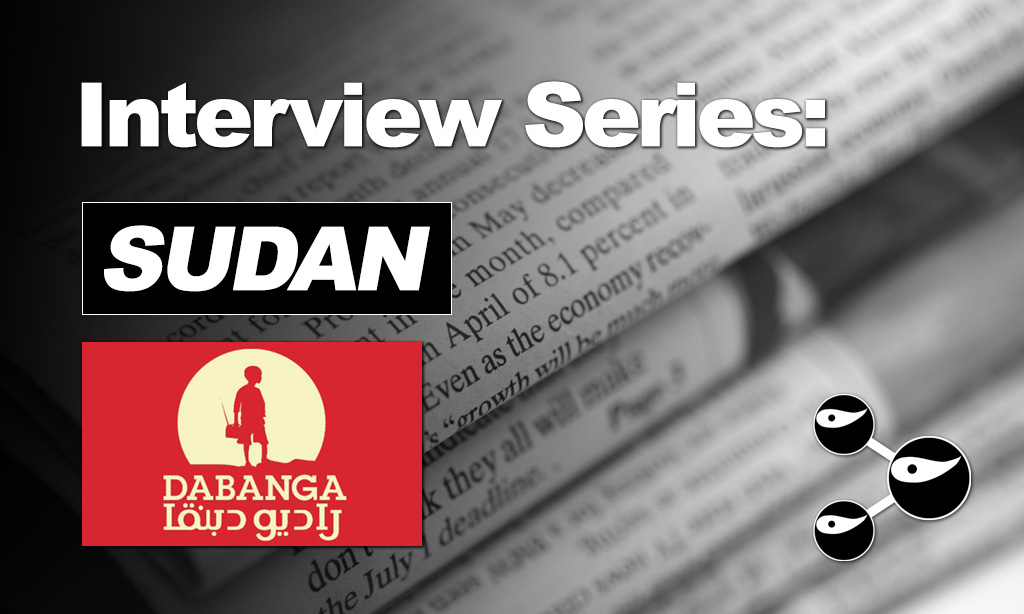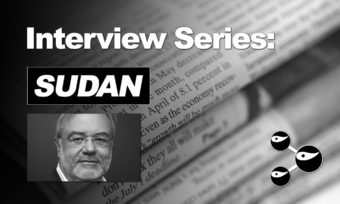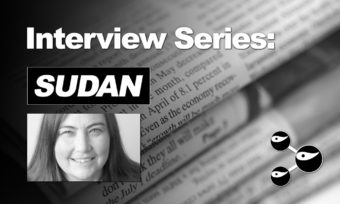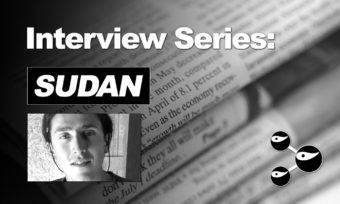The MagkaSama Project Interview Series: Sudan is an ongoing collection of interviews with experts, organizations and journalists. Our first interview featured independent researcher specialized in Sudan, South Sudan and Chad Jerome Tubiana. You can read his interview (in French) on this page.
This time we asked questions to Radio Dabanga. The independent radio station is reaching over 2 000 000 listeners a day in Darfur and Sudan, and for almost 10 years, the radio has provided people living in Sudan with lifesaving information and news. Last June we sent a special newsletter to support their fundraising campaign; today we want to shed light on their outstanding work, and to give insight into what they do, how they collect information and of course, what are the latest news from Sudan.
Nous avons décidé de vous proposer une série d’interviews concernant le Soudan en posant des questions précises à des associations, des experts et des journalistes qui connaissent très bien le Soudan, le Darfour, le Soudan du Sud et l’ensemble de la région.
Après la première partie avec l’interview en français de Jérôme Tubiana que vous pouvez retrouver sur cette page, nous vous proposons aujourd’hui de découvrir la seconde partie (en anglais cette fois) avec nos questions posées à Radio Dabanga. Nous avons relayé au mois de juin dernier leur appel afin de soutenir leur campagne de financement participatif pour que la radio puisse continuer à faire son travail. Chaque jour depuis près de 10 ans, les journalistes de la radio apportent des informations précieuses et indispensables qui sauvent des vies et qui permettent aux populations du Soudan tout entier, de s’organiser et de s’exprimer avec une audience quotidienne de plus de 2 millions de personnes. Dans le cadre de cette série d’interviews, il nous semblait donc essentiel de donner la parole à ceux qui ont créé cette radio et qui y travaillent tous les jours.
Interview Series: Sudan – Part 2: Interview with Radio Dabanga
MagkaSama: Can you please tell us how did Radio Dabanga start? Could you introduce the journalists working at Radio Dabanga to us: who are they, where do they come from and why did they decide to join the radio?
Radio Dabanga: How Radio Dabanga started.
As of 15 November 2008, Radio Dabanga came on air: an exiled radio station by Sudanese, for Sudanese. Since 1 December 2008, the station aired news and information broadcasts. It currently broadcasts one hour of daily programming from Amsterdam.
Radio Dabanga was first and foremost a project of the Radio Darfur Network, a coalition of Sudanese journalists and international (media) development organizations, supported by a consortium of international donors, humanitarian community organizations and local NGOs. Radio Dabanga was conceived and is operated and facilitated by Free Press Unlimited in the Netherlands.
The station is named for a type of large storage vessel called dabanga (also sometimes written damanga or dabunga), which are used by Sudanese farmers to preserve food. Farmers tend to hide their valuables at the bottom of these containers, making them both precious and delicate. Thus there is an Arabic adage, “life is brittle as dabanga; roll it slowly.” The message of this proverb is that diplomacy is needed in life to solve problems.
There are 8 Radio Dabanga journalists who work in the office in Amsterdam. They all grew up in Sudan, but have very different stories about how they came to Amsterdam and found Radio Dabanga.
Editor-in-chief, Kamal Elsadig: I didn’t have an easy path as a Darfuri, but over time, I succeeded in becoming an editor of El Ayam, a respected progressive newspaper in Sudan. I was one of the first journalists to write about the human rights abuses in Darfur. The publisher of my newspaper was soon summoned by the security services. The message was clear: the regime did not want to see any more articles by me, but the newspaper stood behind me, and had to pay for that with a banning order. We were not allowed to talk about the conflict in Darfur. That made me very sad, but also defiant. I wanted to give people the information they needed. I then met two representatives from the Dutch NGO Free Press Unlimited, and an idea was born for an independent radio station for Darfur. This was far too dangerous in Sudan, so I came to the Netherlands in 2008 to begin my work as editor-in-chief of Radio Dabanga. We’ve now enjoyed Dutch hospitality for almost ten years, and that has allowed us to do our important work.
Editor, Ibrahim Jadelkarim: I grew up in Delling in the Nuba mountains, it is a beautiful place on the border of the Savannah. Most people there make their living from agriculture. I left to study theatre at the University of Khartoum because I like writing. From an early study stage I was skilled in writing stories, about what is happening to me. I would always be picked out to read them aloud at school. They say that when you study theatre you know something about philosophy, music, dance, and about literature of course. While I was studying, the military coup happened in Sudan. I finished my studies a year later, in 1990, but I could not earn my living in something as frivolous as theatre. My only opportunities were working as a TV director, in radio, or something similar. At that time there was only one TV and radio broadcasting station and that was owned by the Sudanese state. I chose to work in the private media sector because I refused, on principle, to be in the service of the regime. I had been arrested three times in Sudan for no reason. The police didn’t detain me for a long time, but for me, it was an indication that my human rights and basic freedoms could be taken away. So I fled my country to Ethiopia, where I stayed for three and a half years. In 1997 I came to the Netherlands with a UN resettlement program. My first job here was in the post office in the police headquarters in Eindhoven which helped me practice speaking and reading Dutch. In my spare time I volunteered at a theatre. I then worked for the Dutch railways for eight years, until one day I saw an advertisement on the internet for an opening at RNW Media. Since that time I have been working as a journalist and began working at Radio Dabanga at its nascence in 2008.
Radio Dabanga: Mission.
The mission of Radio Dabanga is to tell people about what is happening in Sudan. For some people our radio makes the difference between life and death. It is essential for people in the conflict areas to know what is the reliable news. They don’t get the news from the state or from any other organisation; in this way, Radio Dabanga is exceptional. Moreover, we want to tell the world about what is happening in Sudan. The world is used to the fact that people are killed, raped, and so on. After a while, people don’t see it as strange anymore. That is very painful, so we must continue to report on violations.
What are the latest news coming from Darfur? United Nations Under-Secretary-General for Peacekeeping Operations, Jean-Pierre Lacroix declared in June that the situation in the troubled Darfur region “has changed radically for the better since the height of the conflict”. Can you confirm this is what you see on the ground?
Deputy Editor-in-chief, Ahmed (his name has been changed for security reasons): On the ground, until now, people in Darfur are not able to get out of their local area to collect firewood, straw, or to bring water. If you read our website, you will find that there are daily reports of killings, beatings, rape, and that people are unable to leave freely or to cultivate their crops. We have also reported that people and goods are not able to move from place to place as everything is escorted by the government and subject to raids. President Omar Al-Bashir himself, when he was discussing the situation in Darfur on Saturday, acknowledged that he had failed to collect all of the arms from militias and Arab tribes who are associated with the government in Darfur.
If Lacroix means there are no clashes between the government and the rebels, then yes, that is true. There are no clashes, except in Jebel Marra (East Darfur). Looting has also reduced, but that is mainly because peoples’ money and livestock have been taken away. The situation is not like it has been for the past years as fighting has largely ceased, but it is not as Lacroix says. People still live in fear, poverty, and hunger in Darfur.
We often mention crackdowns on the media (journalists, newspapers) and people in Sudan. Press freedom is threatened by new laws that would allow a statutory press council to ban a newspaper from publishing for 15 days without a court order. How bad is the free speech situation?
Deputy Editor-in-chief, Ahmed: It’s very bad. First, journalists are arrested, they are subject to intimidation and beatings by the national intelligence and security services. Secondly, some journalists are banned from writing, for example, Ahmed Younes, the correspondent for the London-based paper Al-Sharq al-Awsat. The government withdrew his journalist card and banned him from writing. Thirdly, newspapers are censored. This means that a member of the government comes to the headquarters of the newspaper and reads it before it goes to print to remove the material that is not wanted. Fourth, there has been continuous confiscation of newspapers to damage the financial foundations of the media. Lastly, there is what we call red lines. The national intelligence and security services put something called red lines, meaning that you cannot criticize the president or the ministers, or the official government. This also disallows journalists from writing about demonstrations, shortages of good and services, issues with lack of education, and water issues. To report this is the main job of the journalist and these red lines make the daily newspapers of Sudan empty of content. Effectively, they have become a government bulletin.
The latest law can stop a journalist or newspaper from reporting for 15 days without a court order. Everyone in the country has criticised this, including some ministers. At the moment, we are waiting to know what will happen, but this is not a good sign for journalists and newspapers in Sudan.
The problem is that it is very hard for foreign journalists to get information from Sudan. According to the European Journalism Centre, “the media landscape in Sudan reflects an extremely restrictive environment coupled with a lack of institutional support. The media outlets comprised of television, radio, print and recently social media endure restrictive policies and lack freedom of expression, competition and sufficient market analysis.” That is why Radio Dabanga is so vital – we have the contacts on the ground who can report to us and we are not restricted by the policies which stifle media organisations in the country. This means we are in the best position to report on the news in an independent, unbiased, and objective manner.
You listen to the people and report on their daily life. Considering the wars and the dire economic, political situation across all Sudan, how do Sudanese project themselves in the future? Do they still have hope for a change and how can they make it happen?
Deputy Editor-in-chief, Ahmed: First we have to consider what has been affecting Sudan recently, to understand the dire political and economic situation.
Now in Sudan it is Autumn season and there has been flooding. People have been affected, especially internally displaced people, because they live in temporary shelters set up by wood, carton and plastic. Because it is Autumn there have also been outbreaks of malaria, diahrrea, and so on (read the news on Radio Dabanga website).
The situation is very bad in Sudan as there is been a shortage of bread for weeks. People are standing in long lines for a long time but they do not get bread. There have also been increases in prices of food and medicine. There are many patients who complain to us because they have no medication, especially for chronic diseases like diabetes or high blood pressure. Even life-saving medicine is scarce. Sudanese are really suffering, especially in Darfur because it is a remote area and there are no paved roads to transfer goods there. We can see now there is starvation and hunger. Sudan and especially Darfur face famine (read the news).
Last week we made a big opinion poll among all the states of Sudan with parents and teachers. In Khartoum alone, we found that 1000 pupils and students did not enjoy their breakfast because their parents and family have no money to buy it for them. In Darfur, pupils and students eat one meal per day and most of them leave lessons because of hunger. Last year, it was reported by the Sudanese Food Bank that some 700,000 students were attending school without breakfast. In 2018, the director of this organization estimates that this number has risen to 1.5 million (read the news on Radio Dabanga website).
For people to find hope there must be a change in the current regime, so that they can begin to find real solutions to all the problems I have just listed. In the meantime, Radio Dabanga will carry on producing news and radio broadcasts to provide a source of hope for people in Sudan. Through our output we have made and will carry on making people aware that they have rights. They have the right to dignity, freedom, safety, education, electricity, clean water, and so on. By giving them a platform on which to share their daily experiences, Radio Dabanga shows people that their problems are being taken seriously. We hope one day to return to a Sudan in which we are free to express ourselves, and we must believe that this will happen.
We have many struggles in Sudan, which have become protracted due to conflict and poor governance. There is fighting in Jebel Marra, the Blue Nile, and the Nuba mountains. People are lining up in cities because there is no bread to eat. Patients who need medicine are not able to get treatment due to shortages. Extreme weather such as flooding has caused deaths and destroyed houses. And the Sudanese press is gagged from reporting much of this. But Sudanese people know we can overcome these struggles if there are changes to how the country is being governed at the moment. Sudan has lots of resources and it has the capabilities. Knowing this, we stay hopeful.
After years of sanctions and outright hostility, Sudan is now cooperating with the United States to counter terrorism, and with Europe to stem migration. Did you notice any direct or indirect effects in the country in terms of security and migration?
Deputy Editor-in-chief, Ahmed: First of all, the government cooperated with the US to remove Sudan from the ‘black list’ of terrorism. Second of all, Sudan cooperated with the EU on migration to normalize the relationship. But we must not forget that Sudan sponsors leaders of terrorism and also a lack of measurements that the government takes, allows for human trafficking to take place. There is no criminalization of this by the government, intelligence, security services, or police. I think the US and the EU must not forget these things or work with someone such as Al-Bashir who was indicted for committing war crimes, crimes against humanity, and the genocide in Darfur. So we feel that the international community is choosing to look the other way, while we continue to report on human rights abuses.
Radio Dabanga is operated in the Netherlands, what do you think of the coverage of the events in Sudan by the European media? Do you work with European newspapers/journalists to provide them with reliable, accurate information?
In terms of coverage of Sudan by the European media, most of the news output focuses on issues with refugees and asylum seekers who are crossing the Mediterranean sea to come to Europe, an issue which is important to cover and perhaps is more relatable for European audiences. There have been reports made about Sudanese people arriving in Europe and the challenges they face, for example here.
However, there is very little output in European media about what is happening within Sudan. For example, coverage of ongoing violence in the Darfur region and the Nuba mountains is extremely sparse and even in Sudan there is barely something about those areas, due to censorship. Radio Dabanga focuses on covering vital issues such as conflict, health, food and fuel shortages, sexual abuse, censorship of newspapers – in general the problems ordinary people face in Sudan every day. This means that Dabanga is not only bringing the news to people in Sudan, who lack this information as there is heavy censorship, but also the news in English to international audiences.
As for the second part of the question, we have no direct contact with European news outlets. When there is something happening in Sudan which is worthy of international news, we will get phone calls from European news outlets for our opinion on the topic and sometimes we are interviewed. Then we will give them the impartial, accurate and verifiable news. Other than that, we are often told that the news that we produce is of great use to those covering topical issues in Sudan by news outlets such as the BBC and World Weekly, and IRIN reposts our reports. If you would like to know more about the importance of Dabanga to Dr. Eric Reeves, you can listen to our podcast here.
A couple of weeks ago you launched a fundraising campaign to sponsor your radio. How did it go? Now the campaign has ended, how can people still support you?
We set up a crowdfunding campaign for Radio Dabanga which ran for over a month from 31 May to 7 July with the vision of: raising money to fund our daily shortwave radio broadcasts to Sudan; creating an international brand identity for Dabanga; and extending our outreach to new individuals and organisations whilst revitalising our existing network.
We raised €12,637.55 which translates to 43 days of shortwave radio broadcasting. Similar to Radio Dabanga itself, this crowdfunding campaign would not have been such a success without the support of so many friends, family, colleagues, partners, organisations and the public.
For us, the crowdfunding campaign was a signal that Radio Dabanga does not plan on stopping soon. The buzz we got from everyone involved in the campaign has motivated the team to go to great lengths to secure the funding necessary to keep Radio Dabanga on air.
After the campaign finished we set up a donations page on our website, following in the footsteps of many other media organizations. We are asking for as little as the price of a coffee, €2.50, to support our vital and important work because we believe that if everyone gets together and gives just a little, we can carry on making something great.
Your donation will contribute to daily independent, impartial, unbiased news and information for Sudanese people, more press freedom and freedom of opinion in Sudan, and reach 3.3 million people daily through Radio Dabanga’s shortwave radio, satellite television, website and social media (Facebook and Twitter).









